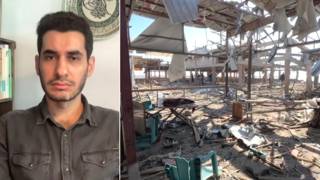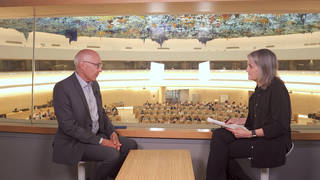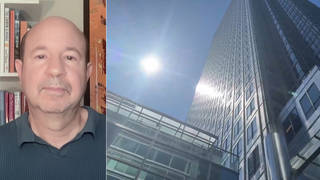
As Congress considers spending cuts to reduce the deficit, critics warn that reduced education, healthcare and other social services will disproportionally impact low-income communities of color. This is the case in New York City, where a high school that provides drug treatment to former gang members is being closed as part of an effort to trim the state budget — all because of a simple data entry error that made it appear the school served 39 students instead of more than 140 troubled youth. Democracy Now!’s Jaisal Noor filed this report.
JAISAL NOOR: For the past 41 years, the Alpha School has built a reputation for turning around the most troubled kids from Brooklyn’s toughest neighborhoods. Based in East New York, the school’s one-of-a-kind approach combines a drug and alcohol abuse prevention and treatment facility with GED classes and job training and placement. Its CEO, Barry Addison, or Mr. B, as he’s known by students, says he takes the kids everyone else has given up on.
BARRY ADDISON: A lot of them come from broken homes. A lot of them, you know, they live in the projects. They live in environments where it’s gang-infested. And, you know, they’re at-risk young people. And everybody that lives in these communities, a young person, could be at risk. You know what I mean? So, the door is open for almost every young person that need these type of services. I needed them. I graduated from here in 1975. So, you know—and here I am, you know, many years later, still servicing the same kind of people, young people, that I was, you know, running with the gangs and robbing and using drugs and dealing drugs. And this is what we do.
JAISAL NOOR: After 41 years of helping troubled youth, budget cuts may force the school to close, leaving its students with few options. Just a few weeks ago, Mr. B got a notice from the New York State Office of Alcoholism and Substance Abuse Services. Due to a simple clerical error on its budget request form, the school lost all of its funding. The school reported it served 39 students. In fact, the school had served between 140 and 170. The error made it appear the school was underperforming, making it a target for budget cuts. Mr. B says he was informed he could not appeal the decision.
BARRY ADDISON: The letter said that, you know, they were trying to balance the budget. And, you know, with this—you know, the trying times of 2011, we—there has to be some cuts. And they decided to cut my program.
JAISAL NOOR: The state’s decision has shocked many of the school’s current students. Like many of his peers, 20-year-old Brooklyn resident Curtis Garner was kicked out of the public school he attended for chronic bad behavior and truancy. Two years ago, he started attending the Alpha School and began to turn his life around.
CURTIS GARNER: I can’t even tell you why they want to close it down. All I could say is, I could tell you a reason why it should stay open. Look at everybody who came out here. I’ll tell you, I bet you one thing, anybody who came out here ain’t in the streets right now.
JAISAL NOOR: The school has received broad community support. Local and state politicians, clergy, and even the New York Police Department have publicly backed the school. The school’s chief, Mr. B, reads a letter written by Brooklyn District Attorney Charles Hynes.
BARRY ADDISON: [reading] “The Alpha School prevention program, and programs like it, are an excellent alternative to these prisons. It costs $370,000 annually to run the Alpha School prevention program, compared to $240,000 annually to imprison a child in a juvenile detention center. Since the recidivism rate of these young people is 78 percent within three years of release, it would be a travesty to defund the Alpha School’s highly successful program.”
JAISAL NOOR: Today, the school’s classrooms remain empty. It’s been forced to lay off its staff and cancel summer classes. But the school’s supporters have launched a campaign to pressure the state to restore funding, and they’re also appealing to private donors. Mr. B vows the school will reopen in the fall.
Reporting for Democracy Now! from New York, this is Jaisal Noor.












Media Options